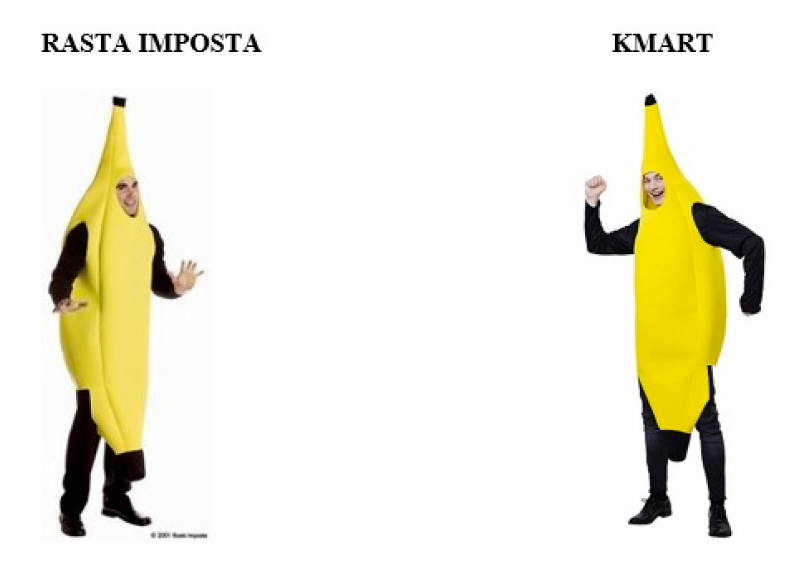Halloween is right around the corner, hand-in-hand with the purchase of candy and other Halloween accoutrements is the purchase of costumes. Halloween is a big money maker for retailers. It is estimated Americans will spend $9.1 billion on Halloween-related items this year, $3.4 billion of that will be spent on costumes alone.
One costume, almost guaranteed to be seen this Halloween season, is the banana costume. The bright yellow ensemble with cutouts for the face and arms is a Halloween staple, and for one company, Rasta Imposta, a large part of their revenue. Kmart has purchased the banana costume from Rasta Imposta since 2008. This year the two companies failed to reach an agreement and Kmart decided to go with another vendor to fill the banana suit void.
Upon hearing Kmart was going with another vendor Rasta Imposta sued Kmart Corp., and its parent company, Sears Holding Corp., for copyright infringement, trade dress infringement, and unfair competition. According to Rasta Imposta the “infringing” costume is a “direct replication and knockoff of [their] copyrighted Banana Design” and “Kmart is not free to simply appropriate Rasta Imposta’s intellectual property for its own business advantage without Rasta Imposta’s consent.” Rasta Imposta is seeking damages and injunctive relief.
Rasta Imposta started selling the banana costume in 2001 and in 2010, they obtained Copyright Registration No. VA 1-707- 439 for their design. Due to the costume’s successful sales, the company decided to license the banana suit and consider it to be one of their most important costumes.
According to the complaint the new costume Kmart is selling “has the same shape as the Banana Design, the ends of the banana are placed similarly, the vertical lines running down the middle of the banana are placed similarly, the one-piece costume is worn on the body the same way as the Banana Design, and the [cut-out] holes are similar.”

Some would argue this case is a hard sell as there is no originality in a banana; a banana’s elements are what they are and cannot be copyrighted because those characteristics are what a banana naturally looks like; Rasta Imposta did not create that look.
Due to a recent Supreme Court Ruling we previously wrote about, copyright on clothing, uniforms, etc., is not that black and white. In Star Athletica, L.L.C. v. Varsity Brands, Inc., the Supreme Court found that the design feature of a cheerleading uniform is separate from the uniform itself and is protectable under the Copyright Act. Justice Clarence Thomas who authored the majority opinion stated:
“We hold that an artistic feature of the design of a useful article is eligible for copyright protection if the feature (1) can be perceived as a two- or three-dimensional work of art separate from the useful article and (2) would qualify as a protectable pictorial, graphic, or sculptural work either on its own or in some other medium if imagined separately from the useful article.”
A question that will need to be answered in the Rasta Imposta case is whether or not their banana costume design adds enough originality over other banana costumes to warrant copyright protection.
The case is Silvertop Associates Inc d/b/a Rasta Imposta v Kmart Corp et al, U.S. District Court, District of New Jersey, No. 17-07499.
Suiter Swantz IP is a full-service intellectual property law firm, based in Omaha, NE, serving all of Nebraska, Iowa and South Dakota. If you have any intellectual property questions or need assistance with any patent, trademark, or copyright matters and would like to speak to one of our patent attorneys please contact us.